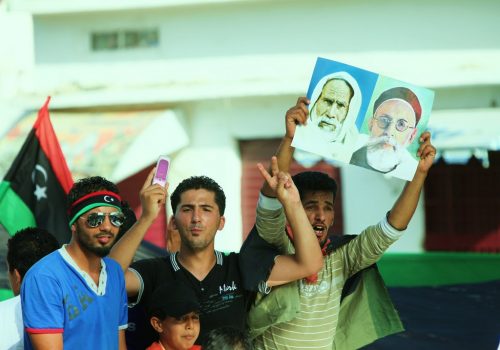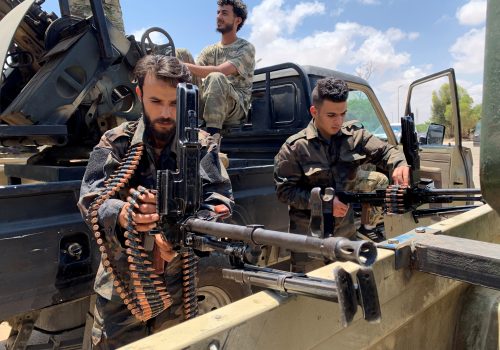Where is the United States? Military basing and energy are the real prizes in Libya.
It wasn’t a surprise to many that Libya’s long-awaited elections scheduled for December 24, 2021 were postponed. As the elections approached, fundamental rules over presidential powers, who was allowed to be a candidate, and election enforcement mechanisms remained unclear.
When elections eventually occur in Libya, they could be a critical step towards its post-civil war reunification. They will also likely signal years of misdirected US Libya policy because they will reinforce rather than reverse Russia and other external actors’ important geostrategic military and energy objectives, as they are much less concerned about Libya’s election postponement.
Libya’s post-Muammar Qaddafi instability attracted a range of regional actors looking to capitalize on the country’s transition. While the US looks solely at elections as both a means and an end to Libya’s future prosperity, key players such as Russia, Turkey, and the United Arab Emirates (UAE) have different ends in mind—their focus remains on Libya’s economic and strategic value. And, unlike the US, these countries have been willing to employ relatively limited resources to influence conditions on the ground.
Russia in Libya
Russia sees Libya as a valuable southern Mediterranean military and economic foothold. It has likely placed these interests ahead of any concern with Libya’s future political structure. In this regard, like other actors in Libya, Russia is positioning itself on real interests, thus, playing an entirely different game than the US.
Russia’s only naval base outside the former Soviet Union is at Tartus, Syria, which provides it access to the Mediterranean and Levant. Russia learned that its Tartus base provided tactical and strategic benefits over the last decade of war in Syria and, for a small cost, realized that it could influence the country’s trajectory and prevent the collapse of the Bashar al-Assad regime. Establishing a similar presence in Libya would expand Russia’s Mediterranean reach and again deter US and western presence and influence. To achieve these goals as it did in Syria, Russia has deployed at least one thousand Wagner mercenaries to support General Khalifa Haftar—a leading contender to become the country’s next president—and his Libyan National Army’s (LNA) hold on eastern Libya.
Russia likely didn’t deploy its mercenaries to Libya to seek a democratic transition or merely establish its latest military outpost. Instead, Russia probably intends to use its military presence to extend political and economic influence to include Libya’s oil and gas sector. Some parts of the Mediterranean and southern Europe are looking to diversify away from Russian natural gas dependency and Libyan’s oil and gas reserves could offer additional supplies for Russia’s adversaries or partners. By doing so, it can prevent Libya from becoming integrated into an emerging east Mediterranean and southern Europe energy market.
Other countries’ interests in Libya
But Russia isn’t the only foreign power throwing its support behind Haftar or other efforts to resist the internationally-recognized Government of National Unity (GNU) based in Tripoli. Sudan has also provided military support—largely financed by the UAE—and France and Egypt have similarly supported these efforts. Against this backdrop, France and Egypt have also weighed in to support the LNA and push back against Tripoli. With Russian, Emirati, and Egyptian support, along with Sudanese military resources, Haftar and competing factions continue to militarily control large portions of eastern and southern Libya.
While this panoply of foreign actors apply leverage to support General Haftar in the East, Turkey, Qatar, and Italy have similarly backed the Tripoli-based GNU. Turkey deployed its forces, including key drone capabilities, along with Syrian mercenaries for its political and economic interests. Turkish support was vital to preventing Haftar’s 2019 assault on Tripoli, where Ankara’s new drone capabilities were tested. Analysts have even argued that Turkey’s drone support was decisive in preventing Haftar from seizing Libya’s capital.
Turkey’s goals are also focused on Libya’s current and potential economic and energy resources. As Egypt, Israel, Palestine, Jordan, Greece, and Cyrus were forming the East Mediterranean Gas Forum (EMGF), Ankara responded in 2019 with a maritime agreement with Tripoli. This agreement served as a geographic veto to both the EMGF and East Mediterranean gas pipeline—a means for Turkish President Recep Tayyip Erdogan to stop Libya from growing closer to Egypt and potentially being accepted into the EMGF. The East Mediterranean pipeline would connect Israel’s natural gas to Cyprus and southern Europe which, like the EMGF, inherently threatens Turkey’s territorial and maritime claims in Cyprus. Additionally, it was a further signal of Libya’s future importance for East Mediterranean energy resources.
Whether it be Turkey, Qatar, and Italy’s support for the GNU or Russia, Egypt, and UAE’s support for the LNA, the struggle for Libya’s future has always been about larger issues than a unified democratic system. As evidenced, these countries are keenly interested in how Libya’s geo-strategic location and resources will benefit their regional aspirations.
Much has been made of the Berlin negotiations that were designed to pave the way for the removal of foreign mercenaries and chart the election roadmap. However, the real negotiations—over Libya’s oil exports—were held in Russia between Haftar and Tripoli. This deal removed the blockade and determined the revenue sharing of Libya’s oil exports. While western powers were diplomatically negotiating political agreements that were impossible to enforce, such as the removal of proxy mercenaries, Russia and Turkey were determining their role in Libya’s energy future.
What about the United States?
We can now assess that the US Libya policy of the last several years will likely prove to be a strategic failure. The US has viewed Libyan political unification, fully codified through the theater of national elections, as both the means and the ends of influence in Libya. Somehow, American-supported democratic efforts will preserve US interests and, thus, compete with key adversaries such as Russia. Instead, the reality is that the US has played a different game entirely.
Even if presidential and, eventually, parliamentary elections occur in Libya, the UAE, Turkey, Russia, and a range of other external actors have dedicated relatively small, but sufficient resources to preserve their interests, which extend well beyond elections. Russia will retain significant leverage over Libya’s oil and gas sector and will be well-poised to capitalize on future gas development and exports. Additionally, Turkey has similarly postured itself to militarily control Tripoli and leverage Libya against broader energy and diplomatic cooperation in the eastern Mediterranean. This situation is even more frustrating given the decades-long track record of US energy companies successfully operating in Libya and the squandered potential to couple US influence with commercial partners to strengthen support in the country.
Nevertheless, the US continues to champion the value of elections, regardless of their legitimacy or the power politics played in the background. The question then becomes how and why did the US lose strategic leverage in Libya? Russia’s influence in places like Syria, Eastern Europe, and now the Mediterranean are places where the US should be employing resources to achieve strategic gains for great power competition with China and Russia, rather than addressing them individually or not at all.
However, Libya is the latest example where the US and the US Department of Defense, in particular, showcase the mismatch between rhetoric and reality and the belief that this competition is primarily security focused. Libya is also where the US has failed to realize and act upon the key role energy resources play in these regional competitive spaces. If the US is going to compete and win based on its relative strength, it will have to learn to balance employing limited means to achieve strategic objectives. And it must decide to compete even in places like Libya, where it turns a blind eye to where Great Power Competition is really occurring.
Matthew Zais is a nonresident senior fellow with the Atlantic Council’s Scowcroft Middle East Security Initiative and the vice president of government affairs for Hillwood and HKN Energy Ltd. Most recently he served as the principal deputy assistant secretary of international affairs at the US Department of Energy. Follow him on Twitter: @matthewzais.
Further reading
Thu, Oct 21, 2021
A return to a constitutional monarchy may solve Libya’s problems
MENASource By
When it comes to choosing their next chapter, some Libyans have already identified a promising path forward: restoring the 1951 constitution, which called for a representative, technocratic government with a hereditary monarch.
Tue, Dec 21, 2021
At least three of Libya’s presidential candidates may not be fit for the role. Here’s who they are.
MENASource By Alia Brahimi
An examination of the most controversial presidential candidates out of a crowded field of ninety-eight reveals some of the complications embedded in the electoral process, and how the polls in Libya could unravel rather than realize its democratic promise.
Wed, Oct 28, 2020
For Turkey, the Libyan conflict and the eastern Mediterranean are inextricably linked
MENASource By
The proxy confrontation playing out in Libya has intensified a regional competition for resources in the waters of the eastern Mediterranean, where several overlapping claims for maritime jurisdiction by Turkey, Egypt, Greece, and Cyprus have fueled escalating tensions.
Image: Two men paste election posters with candidates of the Al Watan party, running for Libya's National Congress, on a wall in Tripoli June 21, 2012. Libyans will go to the polls on July 7. REUTERS/Ismail Zitouny


